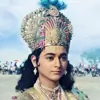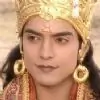RamSitaKiDasi
The serial showed it correctly, except for one detail. Rama first offered Lakshman the post of yuvraj, but Lakshman declined. Rama kept offering it, but he kept declining. Finally, Rama offered it to Bharat.
6.128.91-92. saH mahaayashaaH= that renowned; raaghavaH= Rama; paramodaaraH= of a very generous nature; nihataariH= having destroyed his enemies; shaasan= and ruling; akhilam= the entire; raajyam= kingdom; shashaasa= enjoyed (it); parayaamudaa= with great delight; raamaH= Rama; dharmavatsalaH= affectionate of righteousness; uvaacha= spoke; lakShmaNam= to Lakshmana; dharmajJNaH= the knower of righteousness. (as follows).
That renowned Rama, of a very generous nature, having destroyed his enemies and ruling the entire kingdom, enjoyed it with a great delight. Rama, affectionate of righteousness, spoke to Lakshmana, the knower of righteousness (as followers):
6.128.93. dharmajJNa= O Lakshmana, the knower of what is right!; aatiShThaH= rule; mayaa saha= with me; imam= this; gaam= earth; puurva raajaadhyuShitaam= as ruled by the earlier kiings; balena= with the help of army; dhR^itaa= Installed; yauvaraajye= in the office of Prince Regent; tvam= you; udvahasva= bear; mayaa tulyam= like me; taam dhuram= that burden (of sovereignity); yaa= which (was borne); pitR^ibhiH= by our forefathers.
"O Lakshmana, the knower of what is right! Rule with me, this earth, as ruled by the earlier kings, with the help of an army. Installed in the office of Prince Regent, bear like me, the burden (of sovereignty), which was borne by our forefathers."
6.128.94. sarvaatmanaa parhanuniiyamaanaH= eventhough in all ways, being repeatedly entreated; yadaa= when; saumitriH= Lakshmana; nopaiti= did not give; yogam= his consent; niyujyamaano.api= nay, even being appointed; yauvaraajye= to the office of prince Regent; mahaatmaa= the great-souled Rama; tataH= thereupon; abhyaShiNchat= consecrated; bharatam= Bharata.
When Lakshmana did not give his consent, even though being repeatedly entreated in all ways, nay even being appointed to the office of Prince Regent, the great-souled Rama thereupon consecrated Bharata.
Actually, as per the rules of succession, after the king's eldest son, his younger sons would be in the line of succession. So the priority to the throne of Ayodhya was Rama, Bharat, Lakshman & Shatrughan. Since Rama didn't have any sons @ the time, Bharat automatically became yuvraj. (Similarly, in the Mahabharata, after the Pandavas won the war and Yudhisthir became king of Hastinapur, Bhima became his yuvraj.)
One thing I did find curious/interesting was that even after Kush & Luv were united w/ Rama, the latter did not make Kush yuvraj. In fact, even after Lakshman's passing, when Rama resolved to follow him, he asked Bharat to succeed him. Bharat refused to take the throne a 2nd time, and suggested that Kush be given Ayodhya, and Luv South Kosala. Rama agreed to that, and then crowned them accordingly. (Again, similarly, Bhima remained yuvraj until Yudhisthir abdicated, and then the throne was handed over to Parikshit).
One thing you are right about - the idea of having an yuvraj is to have either a 'deputy-king', if you will, for the present, or a future-king for the future. I think that in both cases, Kush & Parikshit should have been made yuvraj ahead of being crowned, so that they could hit the ground running when they became kings. It's something like being the vice captain of a cricket team - while you do want your next best leader to be the captain should the current captain be unavailable for a match/tour, it's even better to have someone somewhat younger than the current captain, so that after the current captain steps down, he can lead for a few years.
P.S. LJR, the book I took it from was a brief biography of about all the dramatis personae that one can find in the Mahabharata. If I see what Adi Parva has to say, I'll reproduce it here. Or maybe someone else can.
Edited by .Vrish. - 13 years ago





























